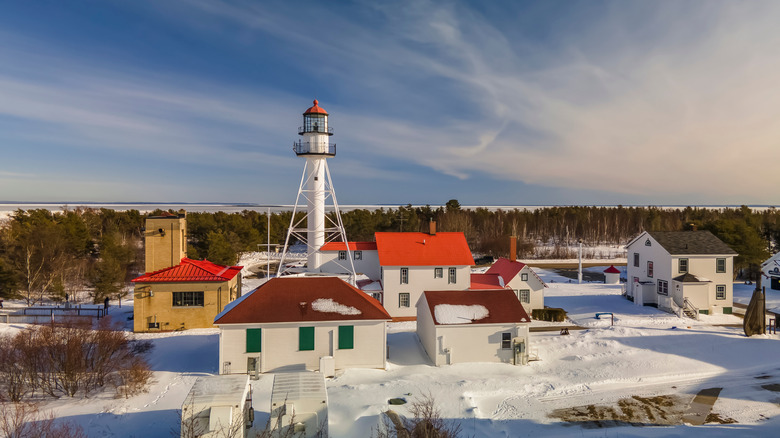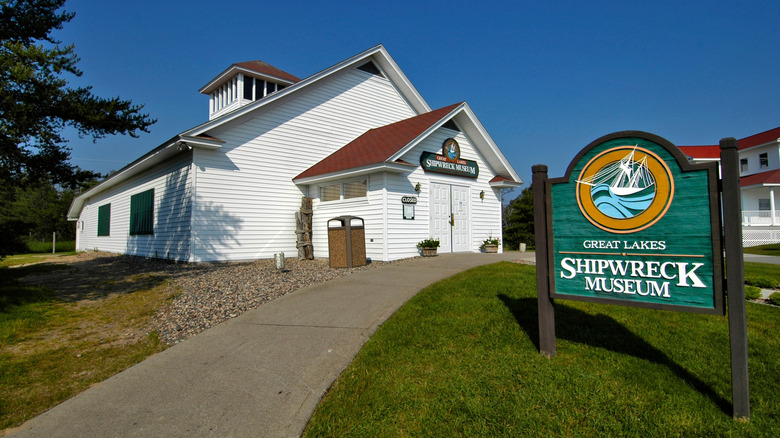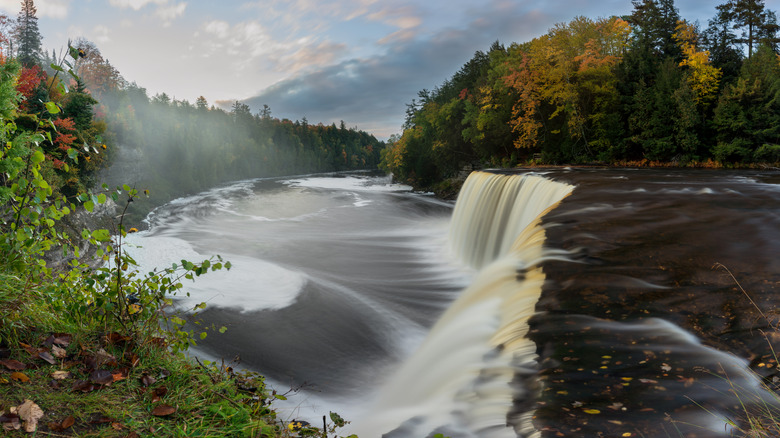A Quirky Town Is The Perfect Gateway To Michigan's Iconic Tahquamenon Falls State Park
Strap on snowshoes for a nighttime walking tour by lantern light. Eat at a diner that offers a menu just for dogs. Learn about the worst shipwrecks in Great Lakes history at a museum inside a historic light station. These quirky activities are all part of normal life in the small, coastal town of Paradise, Michigan.
Paradise is located in the eastern region of Michigan's Upper Peninsula, commonly called the U.P. Most visitors to the town are driving through on their way to Tahquamenon Falls State Park, a popular U.P. destination where nature lovers can discover incredible year-round outdoor adventures.
The Upper Peninsula spans 16,500 square miles, accounting for 28% of Michigan's landmass. It has 1,700 miles of shoreline and is surrounded by three of the Great Lakes: Lake Superior, Lake Huron, and Lake Michigan. Tourists are drawn to the area for its vast forests, gorgeous shoreline, and historic sites, and Tahquamenon is considered a must-see destination while exploring the U.P.'s untamed nature. Paradise sits just 14 miles east of the entrance to Tahquamenon Falls. As the park's de facto gateway, it's worth exploring, too.
Unique sights in Paradise
Tahquamenon Falls State Park offers six campgrounds and lodging areas, and it allows for backcountry camping. If you want to use Paradise as your home base, instead, the town of about 5,000 residents offers multiple motels, hotels, and cabins — including one establishment that boasts an air-refill service for scuba tanks.
There's a unique selection of food, too. Wheelhouse Diner cooks up an array of breakfast and lunch dishes for human customers. For dogs, a "patio pups" menu includes hamburger patties, chicken breast, fried bacon, a hog dog, and vanilla ice cream. For those visitors who want to try some local seafood, Catch of the Day is a food truck parked near the town's grocery store that serves up whitefish straight from Lake Superior.
When you're not exploring Tahquamenon Falls State Park, Paradise and the surrounding area have other attractions worth checking out. There's a concentration of sights on Whitefish Point, 11 miles north of Paradise. There, visitors can tour Whitefish Point Lighthouse, the oldest operating lighthouse on Lake Superior. On site is also the Great Lakes Shipwreck Museum, which teaches visitors about some of the 200 shipwrecks that have occurred in the area known as Lake Superior's "Shipwreck Coast." The lighthouse and the museum are open from May 1 to October 31. If you're visiting while it's snowing — which can begin as early as November and continue as late as April – you can still visit Whitefish Point for the views of Whitefish Bay and a chance to spot snowy owls from the Whitefish Point Bird Observatory. Or, go after the sun sets to try to catch a glimpse of the northern lights.
Activities at Tahquamenon Falls State Park
The snow also transforms Tahquamenon Falls State Park into a playground for winter activities like cross-country skiing, snowmobiling, and snowshoeing. For a unique experience, visitors can book a guided snowshoe hike after dark, when only lanterns and stars light the way.
The park is among the most-visited and most-photographed wild places in the state. The main attraction is one of the most impressive waterfalls in Michigan: Upper Tahquamenon Falls. At about 200 feet across and 50 feet high, it's Michigan's largest waterfall and one of the largest waterfalls east of the Mississippi River. Two platforms give visitors direct views of the rushing water, which is a rusty color because of the plants and bark that leach into the water. The color led to the nickname "Root Beer Falls."
Tahquamenon Falls State Park is open year-round. Visitors can see ice formations on the Upper Tahquamenon Falls in the winter, and in the fall, the waterfall is surrounded by vibrant red, yellow, and orange foliage. If you're visiting from mid-September to late October, make a roadtrip of it and take in the beauty of Midwestern fall foliage at this underrated destination, also in the Upper Peninsula.


